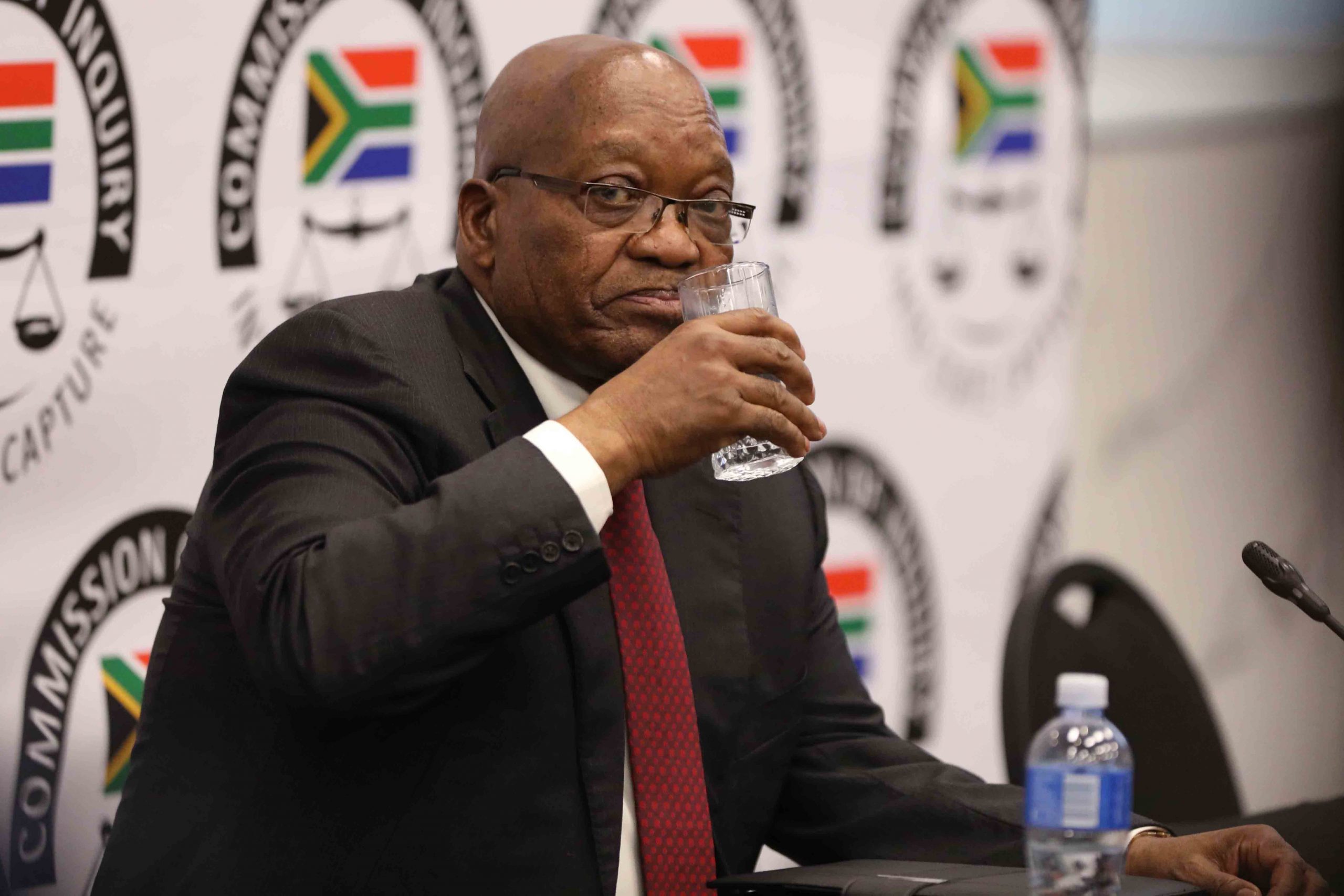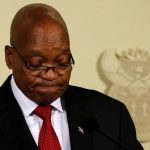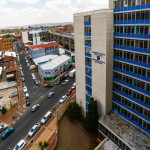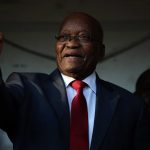Zuma’s Zondo testimony was like a five-day Test
Former president Jacob Zuma spent his week testifying to the commission on state capture by deflecting, misdirecting and sticking with his strategy of crying victim.
Author:
24 July 2019

Former president Jacob Zuma’s five-day appearance at the commission of inquiry into state capture unfolded like a Test cricket match, with a protagonist intent on blocking his way to whatever score he could muster, as long as he remained not out at the end of the innings – and certainly out of prison.
Obdurate in the stonewall, defensive in his deflections, Zuma emerged as the Geoffrey Boycott of South African politics. He was as curmudgeonly with his version of events while president as the Yorkshireman was with his stroke play.
Boycott, who played Test cricket for England from 1964 until the early 1980s, was infamous for occupying the crease for long periods with barely a run scored. He batted with a joylessness that sucked the very life out of a match, and dimmed the light from the game of cricket itself.
Much like Boycott’s attritional approach to bowlers, Zuma sought to wear down the line of questioning by the commission’s evidence leader, advocate Paul Pretorius. The former president’s theatre of amnesia and denial shed no light on the financial evisceration of government parastatals during his nine years as South Africa’s No. 1. Or the pillaging of government budgets for the apparent benefit of a patronage network that included families such as the Guptas, the Zumas and the Magashules in the Free State.
Related article:
Off the bat, Zuma set a meandering pace for his testimony. The constitutional imperative for accountability when wielding state power was lost in his every cough, clearance of the throat, non-answer, misdirection and loss of memory.
He controlled the tempo from his first morning on Monday 15 July, plodding through what he claimed was a 30-year conspiracy to, initially, “character assassinate” him. Then the plot apparently turned deadly with suicide bombers planning to take Zuma out at a music concert, explosive devices found on the presidential plane more than once during his tenure and several unsuccessful attempts to poison him. Allegedly.
Zuma provided no proof to back up any of his claims, but remained adamant that shadowy intelligence forces, local and international, thought it important to be rid of him.
Zuma told the commission chaired by Deputy Chief Justice Raymond Zondo: “There has been a drive to remove me from the scene. A wish that I must disappear.”
Shadowy norm
This was a refrain repeated as often during Zuma’s opening statement as the insistence that “I have been provoked to the last degree” and that it was his turn to be “nasty” by “outing” alleged spies like Ngoako Ramatlhodi and Siphiwe Nyanda, after years of “acting presidential” and allowing criticisms against him to slide. Both were former ministers and ANC comrades who had accused him of malfeasance at the Zondo commission.
While Nyanda and Ramatlhodi were explicitly accused of being impimpis (informers) for the apartheid regime, the alleged compromised struggle credentials of others, from former president Thabo Mbeki to current president Cyril Ramaphosa, were insinuated in the veiled manner that is Zuma’s shadowy norm.
Whether claiming that former president Nelson Mandela also had a relationship with the Gupta family or that he had only relayed the reports of the plot against him to ANC intelligence chief Joe Nhlanhla, the rumours, unsubstantiated allegations and titbits of seeming misdirection that Zuma did share with the commission appeared, in the main, impossible to corroborate – most of those mentioned are dead.
Zuma was, literally, spitting mad. He cleared his throat, often. Tongue thuds against his lips punctured his speech, echoing the unhinged induna mode Zuma assumed during an SABC interview last year on Valentine’s Day as the pressure on him to resign as South Africa’s president became untenable.
The very commission itself, he asserted, was the culmination of this nefarious plot to be rid of him. “This commission was really created to have me coming here and perhaps to find things on me,” he chastised Zondo at one point.
Spiky and indignant
Zuma’s often inchoate attempts to “join the dots” over the past three decades to create a counter narrative to the one alleging he was “the king of corrupt people” was punctuated by moments of spiky aggression by his lawyers. On occasion, they ran up to the lectern to address Zondo like indignant bruisers bowling bouncers at the commission.
The first bouncer came on Monday afternoon after Zondo had given Zuma the space and time to ramble on for the day’s first two sessions. Zuma’s lawyers raised concerns that there had not been a proper exchange of documents even though they had received all the documents, some as early as August last year. It was one of several stalling tactics, used often, to eat up the commission’s time.
The wicket had been spicy. Play was called off early on days two and three at the request of Zuma’s legal team, when it appeared that Pretorius was discomfiting the former president with his nagging line of questioning. Or when their client started to speak recklessly or act a little unhinged.
Whenever Pretorius’ questions appeared to be getting too close to any fact or truth that might implicate Zuma, the former president would cast his eyes upwards before a non-answer, as if searching for grey clouds, praying for a rain delay.
Day four, Thursday, was washed out by the rains of lawfare, with Zondo ruling that the two sides find common ground away from the rolling obstructionism of Zuma and his legal team.
Court threat
Zondo, like an umpire dealing with an overexuberant fielding side looking to remove the tail in the final minutes of a Test match, was placed under increasing pressure by the appeals and objections of a legal team claiming the process prejudiced Zuma. They were seeking, ultimately, the dismissal of the claimed 30-year conspiracy against their man.
Day five ended prematurely when Zuma’s legal team threatened to walk off the field and withdraw their client from participating in the commission because of his alleged victimisation through “relentless cross-examination”. A nonsense argument, Pretorius countered, suggesting that the former president was seeking special treatment that was contrary to the commission’s rules and procedures.
Zuma’s lead counsel, advocate Muzi Sikhakhane, threatened to head to the courts to challenge the commission’s processes and perceived “victimisation” of Zuma, a chorus heard for the past 15 years.
The threat of a court challenge to the commission caused the infinitely patient Zondo to call both sides into his chambers, where they agreed on a temporary resolution. The commission would provide Zuma with its areas of interest in the previous testimonies that implicated him. Zuma would then provide a written statement in response to these and may be questioned for a shorter period when he returns.
But the spectre of the legal “filibuster” employed by Zuma’s team at the commission and a historical predilection for lawfare based on the Stalingrad tactics of technical appeals to clog up and contort the legal process remains hanging over the commission and its ability to cast light in the dark corners of state capture.
True character
Zuma’s mission at the Zondo commission appeared to be a simple one: to use his appearance to suggest that he was willing to cooperate with the inquiry while executing a legal strategy that is patently about obstructing the commission’s attempts to establish facts, while building on the default victimhood narrative he has propagated since 2003.
Cricket, the romantics say, reveals the true character of those who play it. And Zuma’s character, with its many constants over the years, revealed itself in and outside of the commission.
There was his cynical manipulation of the economically marginalised to bump up the numbers at a post-commission rally on Friday 19 July. Of the crowd of about 500 people, more than a third were schoolchildren. Using the plight and presence of the black majority as a prop for his political interests has long been a Zuma trademark.
This cynicism extended to his supporters’ attacks on Nyanda, some of whom carried placards asking the former Umkhonto weSizwe leader to account for the disappearance of ANC activist Nokuthula Simelane. Zuma and his supporters have never publicly shown any support or solidarity with the Simelane family… until now.
Related article:
There were the usual bouts of “Zuma logic”. At the rally outside the commission venue on Friday, Zuma again sought to perpetuate his victimhood narrative by resurrecting his 2005 firing as deputy president of the country “because I was implicated in the arms deal”.
Zuma’s assertion has been that he had no influence on the arms deal because he was not working at national government level, an argument that ignores the influence he wielded within both the state and the ANC as the party’s chairperson.
This “Zuma logic” included the literal analysis of the term “state capture” as an “exaggeration” because Parliament and the judiciary – the other arms of the state – were, according to Zuma, not included in the commission’s investigation.
There was also Zuma at his anti-factual best.
Former public protector Thuli Madonsela, in investigating the R250 million spent on upgrading his private residence in rural Nkandla, “had found no wrongdoing at all. Nothing!” Zuma told the crowd. But she had “decided to punish Zuma … who had not asked for these things”.
Not quite.
Madonsela found Zuma and his family had benefited from “non-security comforts” like a visitors’ reception centre, swimming pool, amphitheatre, cattle kraal with culvert and a chicken run being built. The spending on Nkandla was “opulence on a grand scale” and had gone “beyond what was reasonably required security”. The spending was, in fact, “unconscionable, excessive and caused a misappropriation of public funds”.
Related article:
Zuma’s tenuous grasp on the truth extended to various court judgments that, he maintained, found there was no corruption case against him. During his opening ramble, Zuma said Judge Herbert Msimang had found “there was no [corruption] case there and he took it out of court” in 2006 and that Judge Chris Nicholson had, in 2008, “said there is no case there. This is just politics and indeed the [spy] tapes confirm what Nicholson was saying”.
Zondo would have known full well that Msimang struck the case off the court roll and did not acquit Zuma, and been mindful of the Supreme Court of Appeals’ blistering overturning of Nicholson’s judgment.
“Not a single person has brought evidence [to the commission] that I am corrupt… Nobody!” he told Friday’s rally, ignoring the testimony of former public enterprises minister Barbara Hogan; former Cabinet spokesperson Themba Maseko, whose evidence he refused to deal with during his stop-start testimony; and others, including two former finance ministers, which the commission was unable to address as it ran out of time.
Ill-suited president
What was most apparent over Zuma’s five days of testimony was his deeply anti-democratic aversion to transparency and accountability. And how profoundly ill-suited he was to become president of a country that, in the halcyon days of the 1990s, had bound itself to a visionary Constitution and was still dreaming of a radically progressive and equal version of itself in future decades.
Boycott, notorious for his long-winded and narcissistic self-appraisal, was intensely disliked by England supporters, the media and his teammates. In 1978, he took over as captain of England when Mike Brearley broke his arm. The team then went to New Zealand, where his blocking and slow batting in the Christchurch Test match looked to derail the chances of an English victory.
His teammates decided to run him out in the interests of winning the match, which the young all-rounder Ian Botham subsequently did.
Brearley, writing in the Sunday Times five years later, said that “when he took over after I broke my arm, [Boycott] won little except the recognition he was not the man to captain England”.
Zuma’s performance last week at the Zondo commission confirmed a similar sentiment of his presidency.



